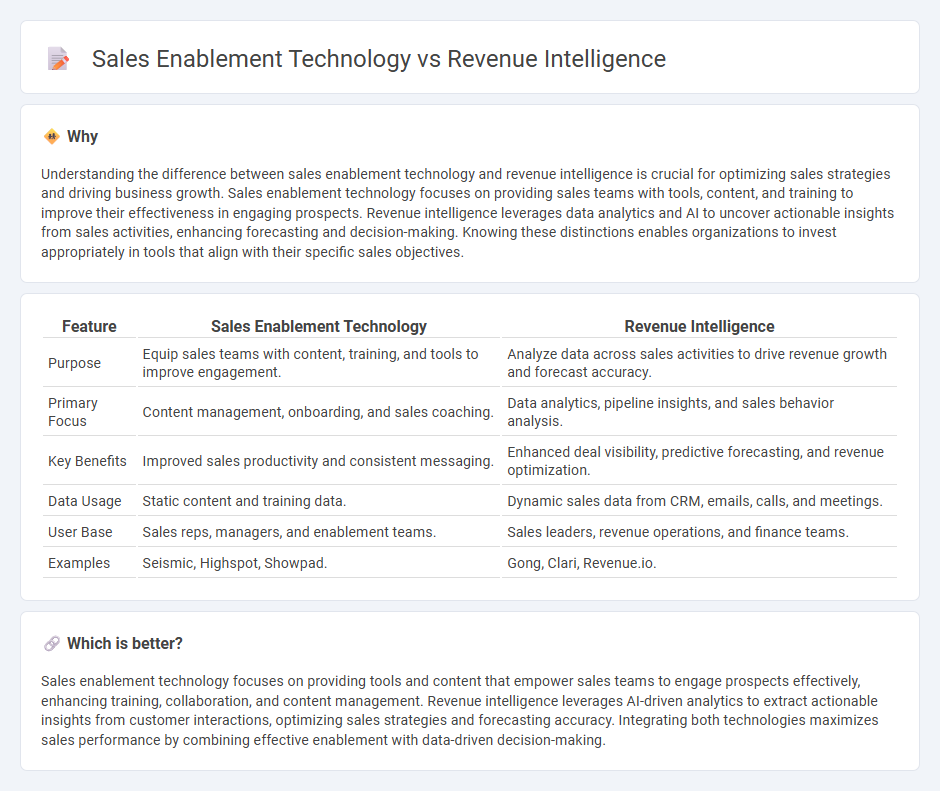
Sales enablement technology equips sales teams with tools and content to enhance productivity and streamline the buyer journey, focusing on training, content management, and guided selling. Revenue intelligence analyzes sales data and customer interactions through AI-driven insights to forecast revenue trends, identify risks, and optimize sales strategies. Explore the differences and benefits of these technologies to boost your sales performance effectively.
Why it is important
Understanding the difference between sales enablement technology and revenue intelligence is crucial for optimizing sales strategies and driving business growth. Sales enablement technology focuses on providing sales teams with tools, content, and training to improve their effectiveness in engaging prospects. Revenue intelligence leverages data analytics and AI to uncover actionable insights from sales activities, enhancing forecasting and decision-making. Knowing these distinctions enables organizations to invest appropriately in tools that align with their specific sales objectives.
Comparison Table
| Feature | Sales Enablement Technology | Revenue Intelligence |
|---|---|---|
| Purpose | Equip sales teams with content, training, and tools to improve engagement. | Analyze data across sales activities to drive revenue growth and forecast accuracy. |
| Primary Focus | Content management, onboarding, and sales coaching. | Data analytics, pipeline insights, and sales behavior analysis. |
| Key Benefits | Improved sales productivity and consistent messaging. | Enhanced deal visibility, predictive forecasting, and revenue optimization. |
| Data Usage | Static content and training data. | Dynamic sales data from CRM, emails, calls, and meetings. |
| User Base | Sales reps, managers, and enablement teams. | Sales leaders, revenue operations, and finance teams. |
| Examples | Seismic, Highspot, Showpad. | Gong, Clari, Revenue.io. |
Which is better?
Sales enablement technology focuses on providing tools and content that empower sales teams to engage prospects effectively, enhancing training, collaboration, and content management. Revenue intelligence leverages AI-driven analytics to extract actionable insights from customer interactions, optimizing sales strategies and forecasting accuracy. Integrating both technologies maximizes sales performance by combining effective enablement with data-driven decision-making.
Connection
Sales enablement technology enhances sales teams' effectiveness by providing relevant content, training, and tools that streamline the buyer's journey. Revenue intelligence platforms analyze communication data and sales activities to deliver actionable insights that improve forecasting accuracy and deal outcomes. Integrating sales enablement with revenue intelligence creates a data-driven ecosystem that optimizes sales performance and accelerates revenue growth.
Key Terms
**Revenue Intelligence:**
Revenue intelligence leverages AI-driven analytics to provide real-time insights into sales performance, customer behavior, and pipeline health, enabling data-driven decision-making for maximizing revenue generation. This technology integrates CRM data and communication logs to uncover hidden opportunities and forecast sales outcomes with greater accuracy. Explore how revenue intelligence can transform your sales strategy by delivering actionable insights and boosting efficiency.
Data Analytics
Revenue intelligence leverages advanced data analytics to uncover actionable insights from sales activities, customer interactions, and CRM data, driving smarter decision-making and forecasting. Sales enablement technology emphasizes providing sales teams with content, tools, and training, often supported by analytics to track engagement and effectiveness. Explore how integrating both technologies can transform your sales strategy through data-driven performance enhancements.
Forecasting
Revenue intelligence leverages AI-driven analytics to enhance sales forecasting accuracy by aggregating data from CRM, communications, and pipeline activity, enabling proactive decision-making. Sales enablement technology primarily supports sales teams with content management, training, and tools, indirectly influencing forecasting through improved team productivity and alignment. Explore how these technologies transform sales forecasting to optimize revenue growth.
Source and External Links
What is Revenue Intelligence? - Revenue intelligence is the practice of collecting and analyzing sales and product usage data across leads, prospects, and customers using AI to generate predictive insights and next-best actions that maximize revenue and improve sales efficiency.
What is revenue intelligence? The 2024 complete guide - Revenue intelligence integrates and analyzes sales, marketing, and customer data from multiple sources with AI to offer actionable insights, improve forecasting accuracy, and guide sales and revenue strategy.
What is Revenue Intelligence? - Revenue intelligence leverages AI, data, and analytics to optimize sales processes, improve customer engagement, increase forecasting precision, and enable data-driven decisions that support sustainable revenue growth.
 dowidth.com
dowidth.com